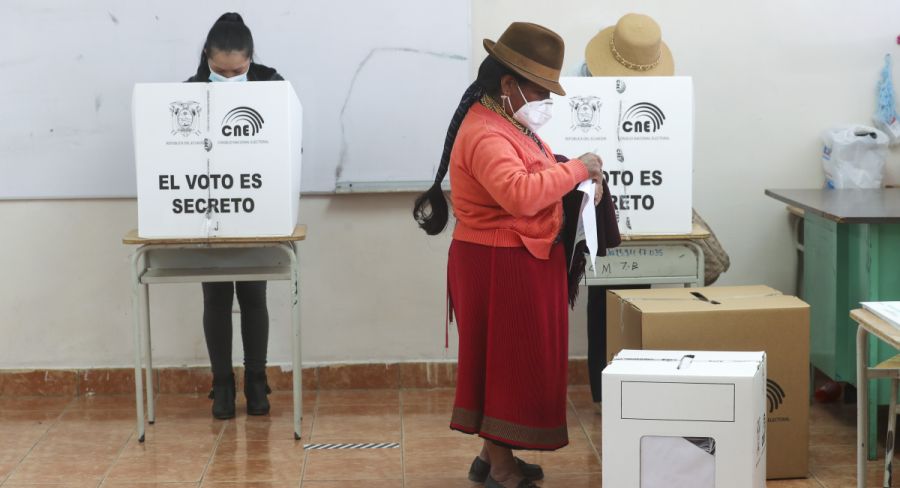RIO DE JANEIRO, BRAZIL – Ecuador, Peru, and Bolivia will hold next Sunday, April 11, an atypical mega election day, marked by the urgency of moving forward with political agendas that respond to the growing discontent of the population and the social and economic devastation caused by the pandemic.

On this “super Sunday”, Ecuador and Peru will hold presidential elections. Bolivia will hold a second round to elect the governors of four departments. The ruling Movement Towards Socialism (MAS), Evo Morales’s party, hopes to recover ground.
Next Sunday will be a star date for polls this year in Latin America, a date on which Chile was expected to participate, as it had planned to hold municipal elections, governors, and the 155 representatitives to the constitutional convention on that day. However, the elections were postponed to May due to the pandemic
A “SUPER SUNDAY” WITH THE THIRD WAVE OF THE VIRUS
In this line of postponements, health authorities have warned of the need to take extreme measures to ensure that campaigns and voting do not become hotbeds of Covid-19 infections, just as the region is entering the dreaded third Covid wave.
Since 2020, the impact of the coronavirus in Latin America, a region where vaccination is progressing at an uneven pace, and the numbers of cases and deaths continue to rise, has caused a distortion in the traditional electoral dynamics and will mark next Sunday’s elections, where there are fears about the effects on democracy.
ECUADOR: CONTROVERSIAL SECOND ROUND
In the case of Ecuador, the presidential second round is preceded by a rarefied climate due to the accusations of fraud made by the indigenous candidate Yaku Perez, who with 19.39% of the votes was behind the center-right Guillermo Lasso, who could barely distance himself from him by 0.35% to secure a place in this round.
In the first place, since February 7, is Rafael Correa’s candidate Andrés Arauz, who took the lead with 32.72% of the votes.
Arauz is the bet of the FCS-Union for Hope movement, influenced by former president Rafael Correa (2007-2017). They seek an “authentic” ‘correísmo’ return to the Ecuadorian Presidency after the turnaround led by the current president, Lenín Moreno.
Polls up to mid-March showed Arauz as the winner, but he seems to be losing support as the final election approaches.
PERU SEEKS A PRESIDENT TO LAST FIVE YEARS
This April 11, Peru will begin to elect the person will assume the Executive Branch after four presidents alternated between 2016 and 2021.
The presidential back-and-forth began in 2018 when Pedro Pablo Kuczynski resigned following revelations of his involvement in the Odebrecht scandal and was replaced by his first vice president, Martin Vizcarra.
On November 9, 2020, Vizcarra was deposed following an impeachment process for moral incapacity that unleashed a large wave of nationwide protests.
The president of Congress, Manuel Merino, assumed power on November 10 but only lasted a week since, after the dismal handling of the protests in which two people died at the hands of the security forces, he had to resign.
The Presidency then fell on November 16 to Francisco Sagasti, who went from being head of the Legislature to head of State in a matter of hours.
As happened five years ago, Keiko Fujimori, then defeated by Kuczynski, is running again, although it seems that she will have to fight to enter a possible second round on June 6.
According to the polls, neither Fujimori nor Yonhy Lescano (Acción Popular, center-left), Rafael López Aliaga (Renovación Popular, ultra-conservative), George Forsyth (Victoria Nacional, center-right), Hernando De Soto (Avanza País, neoliberal right) nor Verónika Mendoza (Juntos por el Perú, left) would reach the percentage needed to win the Presidency in the first round on April 11.
SECOND ROUND IN FOUR DEPARTMENTS OF BOLIVIA
The Bolivian departments of La Paz, Chuquisaca, Pando, and Tarija will define on April 11 who will rule their destinies in a second round run-off after the March 7 elections, in which the ruling Movimiento al Socialismo (MAS) of Evo Morales and the current president, Luis Arce, lost ground.
In La Paz, Pando and Tarija, MAS won in the first round. Still, the ruling party is concerned that La Paz’s governorship will pass into the Jalalla movement’s hands, the same as the former president of the Senate, Eva Copa, elected mayor of El Alto, which was a political stronghold of Evo Morales.
CHILE: AN IMMINENT POSTPONEMENT
The protests unleashed in 2019 in Chile, the largest since the end of Augusto Pinochet’s dictatorship in 1990, was the impetus for wanting to overthrow one of the most important vestiges of that era: the 1980 Constitution.
On November 15, 2019, the main Chilean parties signed an agreement to call a plebiscite held on October 25, 2020, in which the option tp adopt a new Constitution won with 78.28%.
Chileans’ distrust of their political class was reflected in the fact that voters preferred that the new Magna Carta be drafted by a constitutional convention made up of 155 citizens instead of a mixed convention composed half by party representatives.
However, the election of the 155 members of the Constituent Assembly that will draft the new Magna Carta, to be held between April 10 and 11, is on hold after President Sebastian Piñera’s request to postpone it to May 15 and 16, as well as the municipal elections, due to the worsening of the pandemic. An official announcement is expected to confirm the postponement this Tuesday, April 6.
Source: efe/dw/brb

